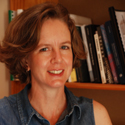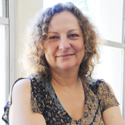Distinguished Teacher Awards
10 November 2009They have their own takes on teaching, but the four lecturers named as the winners of the 2009 Distinguished Teacher Awards (DTA) have at least two things in common: they really like being in a classroom packed with students, and they have, according to the DTA committee, set the bar for teaching at UCT. Here we offer a glimpse into their teaching lives and philosophies.
|
|
|
|
 This work is licensed under a Creative Commons Attribution-NoDerivatives 4.0 International License.
This work is licensed under a Creative Commons Attribution-NoDerivatives 4.0 International License.
Please view the republishing articles page for more information.


 Associate Professor Carrol Clarkson, of the Department of English Language and Literature, teaches a range of material at all levels, from Jane Austen through to critical theory and postcolonial South African fiction. Together with Drucilla Cornell she taught an MA course in the Law Faculty: Revolution in Law and Literature. She also supervises several MA and PhD students. "I try to create an atmosphere of intellectual adventure," says Clarkson, and believes the classroom experience should stand apart from any other learning occasion. "I don't think that a classroom event can or should be substituted by any other form of learning - whether that's reading a book from the library, or Googling something on the internet, or even picking up the lecture notes on Vula." Teaching offers a privileged opportunity to share with others the great ideas, books and artworks that she values in life, Clarkson says.
Associate Professor Carrol Clarkson, of the Department of English Language and Literature, teaches a range of material at all levels, from Jane Austen through to critical theory and postcolonial South African fiction. Together with Drucilla Cornell she taught an MA course in the Law Faculty: Revolution in Law and Literature. She also supervises several MA and PhD students. "I try to create an atmosphere of intellectual adventure," says Clarkson, and believes the classroom experience should stand apart from any other learning occasion. "I don't think that a classroom event can or should be substituted by any other form of learning - whether that's reading a book from the library, or Googling something on the internet, or even picking up the lecture notes on Vula." Teaching offers a privileged opportunity to share with others the great ideas, books and artworks that she values in life, Clarkson says. Carla Fourie, of the Education Development Unit: Commerce, has been teaching financial accounting and financial reporting to first-year students on the Bachelor of Commerce academic development programme for the past nine years. In 2010, she'll teach on the BBusSc academic development stream as well. It's a demanding task, working as she does with students who come to university hamstrung, often, by poor schooling and having to learn in English, a second language for many. But Fourie takes the glass-half-full approach. "I believe that if provided with appropriate support, each student has the potential to succeed," she says. "The greatest challenge when teaching is to be able to identify and create the appropriate environments in which a student's potential can be unlocked and stimulated." Working with and in young people's lives comes with responsibility and accountability, but also rewards. "I often walk out of a lecture knowing more than I did when I walked in, and for me this is the beginning of true learning."
Carla Fourie, of the Education Development Unit: Commerce, has been teaching financial accounting and financial reporting to first-year students on the Bachelor of Commerce academic development programme for the past nine years. In 2010, she'll teach on the BBusSc academic development stream as well. It's a demanding task, working as she does with students who come to university hamstrung, often, by poor schooling and having to learn in English, a second language for many. But Fourie takes the glass-half-full approach. "I believe that if provided with appropriate support, each student has the potential to succeed," she says. "The greatest challenge when teaching is to be able to identify and create the appropriate environments in which a student's potential can be unlocked and stimulated." Working with and in young people's lives comes with responsibility and accountability, but also rewards. "I often walk out of a lecture knowing more than I did when I walked in, and for me this is the beginning of true learning." The DTA is not the first teaching award that Associate Professor Gary Marsden, of the Department of Computer Science, has received. In 2008 he was named an Apple Distinguished Educator, in recognition of how he uses technology in his classes. He's also picked up a raft of accolades for his work in mobile interaction design, which looks at how the design of mobile technology - think cell phones and iPods - keeps the user in mind. Marsden lectures on second- and third-year courses, and to sizeable honours classes. What's his golden rule of teaching? "You have to be absolutely passionate about what you're teaching." And he has to get his students equally excited about the subject at hand. Working in a field where textbooks age quicker than the technology they cover, he also has to think on his feet. So while there's due attention paid to the stock-in-trade theory, students can also expect to learn of plenty of hot-off-the-press developments.
The DTA is not the first teaching award that Associate Professor Gary Marsden, of the Department of Computer Science, has received. In 2008 he was named an Apple Distinguished Educator, in recognition of how he uses technology in his classes. He's also picked up a raft of accolades for his work in mobile interaction design, which looks at how the design of mobile technology - think cell phones and iPods - keeps the user in mind. Marsden lectures on second- and third-year courses, and to sizeable honours classes. What's his golden rule of teaching? "You have to be absolutely passionate about what you're teaching." And he has to get his students equally excited about the subject at hand. Working in a field where textbooks age quicker than the technology they cover, he also has to think on his feet. So while there's due attention paid to the stock-in-trade theory, students can also expect to learn of plenty of hot-off-the-press developments. Associate Professor Melissa Steyn, of the Department of Sociology, started her UCT teaching career back in 1988, running courses to senior undergrads and postgrads in what was then the Professional Communication Unit. Since then, she's co-developed and taught on a score of programmes in the Faculty of Humanities, lecturing on topics such as diversity and power dynamics. These are the same issues she also lectures on these days on the full- and part-time MBA courses at the Graduate School of Business. She grounds her teaching on the maxim that people do their best in settings in which they feel supported, respected, and where limiting assumptions are uncovered through "incisive conversation". Given the topics she covers, that ambition takes on new meanings. "In all my teaching I attempt to give students the opportunity to express their views, to be heard, to listen, and to revise their thinking in light of what they are hearing," she says. "Often, this is especially empowering for students from marginalised groups."
Associate Professor Melissa Steyn, of the Department of Sociology, started her UCT teaching career back in 1988, running courses to senior undergrads and postgrads in what was then the Professional Communication Unit. Since then, she's co-developed and taught on a score of programmes in the Faculty of Humanities, lecturing on topics such as diversity and power dynamics. These are the same issues she also lectures on these days on the full- and part-time MBA courses at the Graduate School of Business. She grounds her teaching on the maxim that people do their best in settings in which they feel supported, respected, and where limiting assumptions are uncovered through "incisive conversation". Given the topics she covers, that ambition takes on new meanings. "In all my teaching I attempt to give students the opportunity to express their views, to be heard, to listen, and to revise their thinking in light of what they are hearing," she says. "Often, this is especially empowering for students from marginalised groups."







